英语语法中的重点句型
英语语法知识点总结

课时一教学任务一、重点语法1.动词be(am,is,are)的用法:be动词包括“am”, “is”, “are”三种形式。
①第一人称单数(I)配合am来用。
句型解析析:I am+…②第二人称(You)配合are使用。
句型解析:You are+…③第三人称单数(He or She or It)配合is使用。
句型解析:She(He, It) is +……④人称复数 (we /you/they)配合are使用。
句型解析:We (You, They) are +……例句 We are in Class 5,Grade are my are good students.用法口诀:我(I)用am, 你(you)用are,is跟着他(he),她(she),它(it)。
单数名词用is,复数名词全用are。
变否定,更容易,be后not加上去。
变疑问,往前提,句末问号莫丢弃。
还有一条须注意,句首大写莫忘记。
1.用括号中适当的词填空。
1. I ________(am, are, is) from Australia.2. She _______ (am, are, is) a student.3. Jane and Tom _________(am, is, are) my friends.4. My parents _______ (am, is, are) very busy every day.5. _______ (Are, Is, Do, Does) there a Chinese school in New York6. _______ (Be, Are, Were, Was) they excited when he heard the news7. There _____ (be) some glasses on it.8. If he _____ (be) free tomorrow, he will go with us.2.用be 动词的适当形式填空1. I ______ a boy. ______ you a boy No, I _____ not.2. The girl______ Jack's sister.3. The dog _______ tall and fat.4. The man with big eyes _______ a teacher.5. ______ your brother in the classroom6. Where _____ your mother She ______ at home.7. How _______ your father8. Mike and Liu Tao ______ at school.9. Whose dress ______ this10. Whose socks ______ they11. That ______ my red skirt.12. Who ______ Ijeans ______ on the desk.______ a scarf for you.15. Here ______ some sweaters for you.16. The black gloves ______ for Su Yang.17. This pair of gloves ______ for Yang Ling.18. The two cups of milk _____ for me.19. Some tea ______ in the glass.20. Gao shan's shirt _______ over there.第二课时(1)英语人称代词和物主代词一、人称代词表示“我”、“你”、“他”、“她”、“它”、“我们”、“你们”、“他们”的词,叫做人称代词。
英语重点语法(考试必备)

英语重点语法(考试必备)一、主语是个句子,或者从句在句中充当主语1.当主语是陈述句时,连接词是that 即:that(不省略)+该陈述句Eg. 1.) That we will be late is certain. (We will be late.)Eg. 1.) That we will be late is certain. (主语从句,that不能省略)2.) I hope (that) we will win the game. (宾语从句,that 可以省略)2.当主语是一般疑问句时,连接词是whether(or not)1.) Whether he will go there is not known. (Will he go there?)2.) Whether they can finish the job (or not) is not clear. (Can they finish the job?)3.当主语是特殊疑问句时,连接词是特殊疑问词“8W+H”即:特殊疑问词“8W+H” +该特殊疑问句的陈述语序(注:8W指的是what/where/which/who/whom/why/whose/when, H 指的是how)1)What he did yesterday is not known. (What did he do yesterday?)2)Where he went yesterday is not clear. (Where did he go yesterday?)3)Which team he liked has not been decided. (Which team did he like?)4)Who won the game seems certain. (Who won the game?)5)Whom he met yesterday is not clear. (Whom did he meet yesterday?)6)Why he was late for the meeting is to be found out.(Why was he late for the meeting?)7)Whose book this is is not clear. (Whose book is this?)8)When he will arrive is not known. (When will he arrive?)9)How we will help the lost boy will be discussed at the meeting.(How will we help the lost boy?)二、主语从句后置1.为了避免主语冗长,句子头重脚轻,经常用it作形式主语,主语从句放在后面作真正的主语.1.) That we will be late is certain.-- It’s certain that we will be late.2.) Whether he will go there is not known.-- It is not known whether he will go there.3.) Where he went yesterday is not clear.-- It is not clear where he went yesterday.2.It 作形式主语常用句型:(that 引导的主语从句是真正的主语)It is possible/important/necessary/clear that...1)It’s said/ reported that.. 据说/据报道…2)It’s been announced/declared that... 已经通知/宣布…3)It seems/appears/happens that… 显然、明显、碰巧..4)It’s no wonder that…并不奇怪/无疑…3.主语从句中谓语动词一般用单数,What引导的主语从句,谓语动词根据表语决定What he needs _is_ that book. What he needs _are_ some books.4.What 与that 引导主语从句的区别Eg. (1) What you said yesterday is right. (What did you say yesterday?)(2) That she is still alive is a puzzle. (谜题) (She is still alive.)练习题1.___ he made an important speech at the meeting was true.A. ThatB. WhyC. WhatD. How2. ___we’ll go camping tomorrow depends on the weather.A IfB WhetherC ThatD Where3.___ is known to us all is that America is a developed country.A. WhichB. AsC. WhatD. It4. It’s known to us all ___ a form of energy .A. water isB. that water isC. is waterD. that water to三、宾语从句一、宾语从句: 宾语是个句子,或者说从句在句中充当宾语1.当宾语是陈述句时,连接词是that 即:that(可省略)+该陈述句1.) I hope (that) he will come tomorrow. (He will come tomorrow.)1.) That we will be late is certain. (主语从句,that不能省略)2.) I believe (that) we will win the game. (宾语从句,that 可以省略)2. 当宾语是一般疑问句时,连接词是whether(or not)/if即:whether(or not)/if +该一般疑问句的陈述语序1.) I ask whether/if Tom knows Jack. (Does Tom know Jack?)2.) I don’t know whether/if he came back yesterday. (Did he come back yesterday?)3. 当宾语是特殊疑问句时,连接词是特殊疑问词“8W+H”即:特殊疑问词“8W+H” +该特殊疑问句的陈述语序(注:8W--what/where/which/who/whom/why/whose/when, H--how)1)I don’t know what he did yesterday. (What did he do yesterday?)2)He wants to know where he went yesterday. (Where did he go yesterday?)3)He didn’t tell me which team he liked. (Which team did he like?)4)We want to know who won the game at last. (Who won the game?)5)His mom asked whom he met yesterday. (Whom did he meet yesterday?)6)He didn’t find out why he was late for the meeting.(Why was he late for the meeting?)7)I am not sure whose book this is. (Whose book is this?)8)They ask me when he will arrive. (When will he arrive?)9)We have discussed how we will help the lost boy.(How will we help the lost boy?)1.当主句的谓语动词是command/demand/insist/order/require/suggest等表示要求或建议的动词时,从句谓语动词用(should)+动词原词,should 可以省略eg (1)She required (that) he (should) go back home right now.She required (that) he go back home right now.(2)I suggested (that) he (should) ask his teacher for help.I suggested (that) he ask his teacher for help.2.当主句中believe/expect/suppose/think等作谓语动词时,否定要前移Eg. I don’t think that he will come tomorrow. (He won’t come tomorrow.) He doesn’t believe that it is true. (It is not true.)3.宾语从句从句的语序必须是陈述语序,即连接词+主语+谓语+其他成分eg. I believe that they will come soon. He asked me whether I was a teacher.They wanted to know what they can do for us.4.宾语从句的时态受主句的限制主句是一般现在时态,从句根据实际情况而定主句是一般过去时态,从句用相应的过去的时态如果从句的动作发生在主句之前,则从句要用过去完成时态eg. 1)She says that she is a student.She said that she was a student.2)She says that she will fly to Japan in a week.She said that she would fly to Japan in a week.5.由whether或特殊疑问词8W+H引导的宾语从句如果宾语从句的主语和主句的主语是同一对象,可以用“疑问词+不定式”做宾语的简单句结构I don’t know what I should do next.I don’t know what to do next.He didn’t know where he would live.He didn’t know where to live.He wasn’t clear which way he should go to reach the bank.=He wasn’t clear which way to go to reach the bank.6.含有宾语补足语时,若宾语是个句子,宾语通常用形式宾语it 代替,真正的宾语放在宾语补足语之后Eg. 1) We think it wonderful that we will go on a trip this weekend. (宾语是陈述句)2) I think it uncertain whether we will win the game. (宾语是一般疑问句)3) We hope it discussed how we will solve the problem. (宾语是特殊疑问句)练习题1. —Do you know ______ the Capital Museum(首都机场)?—Next Friday.A. when will they visitB. when they will visitC. when did they visitD. when they visited2. –Can you tell me ______?–She is in the computer lab(计算机实验室).A. where Linda wasB. where is LindaC. where was LindaD. where Linda is 3。
英语语法解析重点掌握句型与语法规则

英语语法解析重点掌握句型与语法规则英语语法解析:重点掌握句型与语法规则在学习英语的过程中,掌握句型和语法规则是非常重要的。
正确使用句型和语法规则可以使我们的英语表达更加准确、流畅,同时也能够避免一些常见的语法错误。
本文将介绍一些常用的句型和语法规则,并提供一些例句以供参考。
一、主谓一致主谓一致是指主语与谓语在人称和数上要保持一致。
如果主语是第三人称单数,则谓语动词要加上“-s”或“-es”。
例句:1. She likes to read books.(她喜欢读书。
)2. The cats play with each other.(这些猫互相玩耍。
)二、宾语宾语是动词的补充成分,可分为直接宾语和间接宾语。
1. 直接宾语是动作的承受者或所影响的对象。
2. 间接宾语是直接宾语的间接所在之处或所给予之者。
例句:1. He gave me a present.(他给了我一个礼物。
)2. They showed us their photos.(他们给我们看了他们的照片。
)三、条件句条件句用于表达某个条件下可能发生的结果,可以分为三种类型:零条件句、一般条件句和虚拟条件句。
1. 零条件句用于表示客观真理或普遍性的条件。
例句:Water boils at 100 degrees Celsius.(水会在100摄氏度沸腾。
)2. 一般条件句用于表示可能发生的条件和结果。
例句:If it rains, we will stay at home.(如果下雨,我们就会待在家里。
)3. 虚拟条件句用于表示不太可能实现的条件和结果。
例句:If I were you, I would study harder.(如果我是你,我会更加努力学习。
)四、被动语态被动语态用于表示主语是动作的承受者而不是执行者。
被动语态的构成:be动词(根据时态变化)+ 过去分词例句:1. The book was written by Mark Twain.(这本书是马克·吐温写的。
pep3~6年级英语重点句型及语法
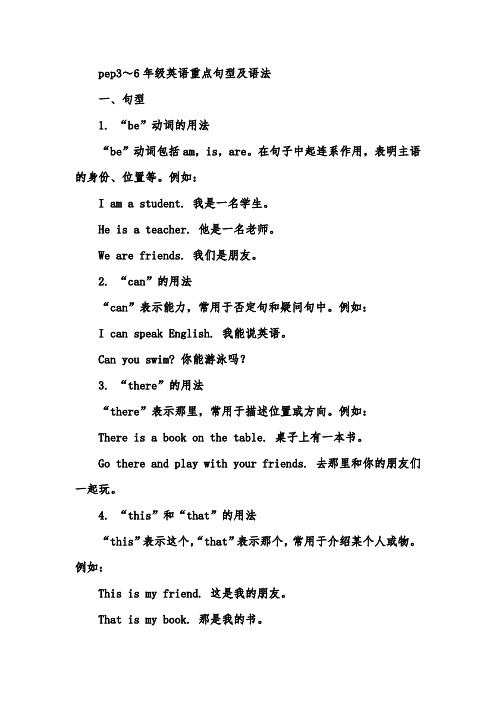
pep3~6年级英语重点句型及语法一、句型1. “be”动词的用法“be”动词包括am,is,are。
在句子中起连系作用,表明主语的身份、位置等。
例如:I am a student. 我是一名学生。
He is a teacher. 他是一名老师。
We are friends. 我们是朋友。
2. “can”的用法“can”表示能力,常用于否定句和疑问句中。
例如:I can speak English. 我能说英语。
Can you swim? 你能游泳吗?3. “there”的用法“there”表示那里,常用于描述位置或方向。
例如:There is a book on the table. 桌子上有一本书。
Go there and play with your friends. 去那里和你的朋友们一起玩。
4. “this”和“that”的用法“this”表示这个,“that”表示那个,常用于介绍某个人或物。
例如:This is my friend. 这是我的朋友。
That is my book. 那是我的书。
5. “what”和“where”的用法“what”常用于询问事物或人的身份,“where”常用于询问位置或方向。
例如:What is your name? 你叫什么名字?Where is the post office? 邮局在哪里?二、语法1. 现在进行时现在进行时表示正在进行的动作或存在的状态,常与now,look 等词连用。
例如:We are studying now. 我们正在学习。
Look! The bird is singing. 看!那只鸟正在唱歌。
2. 现在完成时现在完成时表示已经完成的动作或过去发生的动作对现在造成的影响或结果。
常与already,just等词连用。
例如:I have already finished my homework. 我已经完成了我的作业。
He has just come back from work. 他刚刚从工作回来。
高中英语常用重点句型总结(145条)
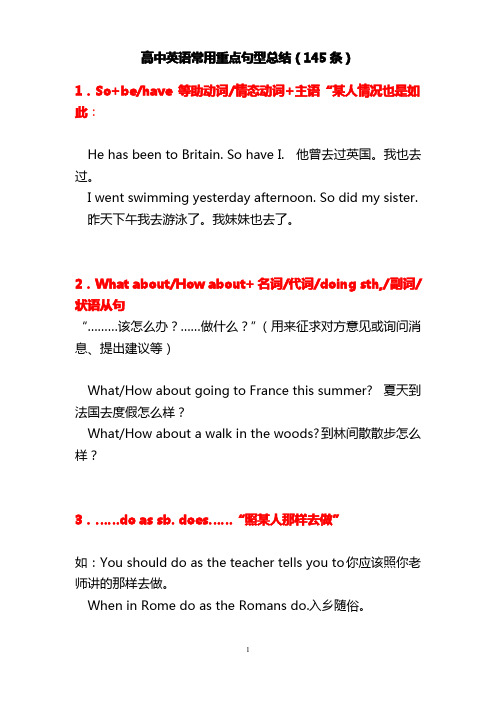
高中英语常用重点句型总结(145条)1.So+be/have等助动词/情态动词+主语“某人情况也是如此:He has been to Britain. So have I.他曾去过英国。
我也去过。
I went swimming yesterday afternoon. So did my sister.昨天下午我去游泳了。
我妹妹也去了。
2.What about/How about+名词/代词/doing sth,/副词/状语从句“………该怎么办?……做什么?”(用来征求对方意见或询问消息、提出建议等)What/How about going to France this summer?夏天到法国去度假怎么样?What/How about a walk in the woods?到林间散散步怎么样?3.……do as sb. does……“照某人那样去做”如:You should do as the teacher tells you to .你应该照你老师讲的那样去做。
When in Rome do as the Romans do.入乡随俗。
4.None of+名词/代词+do/does……“在……中没有任何一个做……”如:None of the telephones can work。
所有的电话都不能工作了。
None of them are/is interested in physics.他们中没有一个人对物理感兴趣。
5.Not+all+复数名词/不可数名词+are/is……“并非全部……”;“并不是所有的……”如:Not all the parts of the car will be made in the factory.并不是所有的汽车部件都在这家工厂制造。
Not all the students can pass the exam.并非所有的同学都能通过考试。
Not all factories here produce shirts.这儿的工厂不都生产衬衣。
大学英语语法重点

二、may can might could 的异同
1. May / might 事实上的可能 2. Can / could 理论上的可能
The road may be blocked. The road can be blocked. Can he tell a lie? Yes, he may. 3. Not 否定 may /might, 否定的是句子中的主动词。 They may / might not get there on time tomorrow. They can / could not get there on time tomorrow.
三、做状语 –ing/ to
1. In order to, so as to, only to, too…to.., so … as to… 2. 悬垂
Going home, mother cooked a good meal. 3. 独立主格
Weather permitting, we will go for a picnic tomorrow. 4. -ing/-ed 主动 被动
Ought to 与should 基本类似,但强调责任、义务、应该做, 或者逻辑上的必然性时用ought to
As a student you ought to study hard. I think I should try to lose some weight. It is starry tonight; it ought to be a fine day tomorrow.
3. needn’t have done Since the meeting has been canceled, they needn’t
高中英语语法总结句式归纳
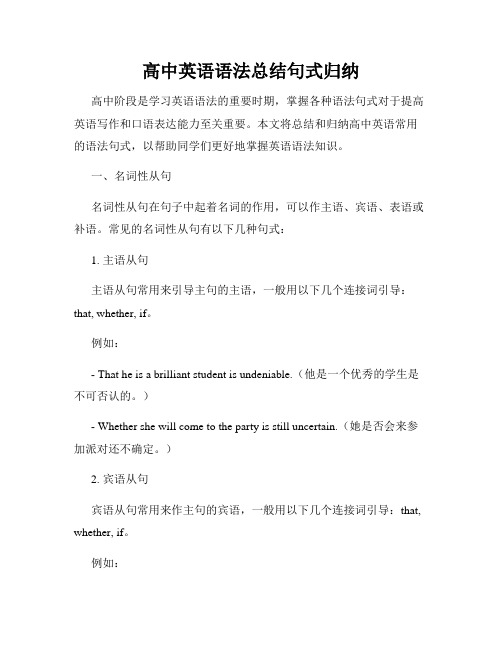
高中英语语法总结句式归纳高中阶段是学习英语语法的重要时期,掌握各种语法句式对于提高英语写作和口语表达能力至关重要。
本文将总结和归纳高中英语常用的语法句式,以帮助同学们更好地掌握英语语法知识。
一、名词性从句名词性从句在句子中起着名词的作用,可以作主语、宾语、表语或补语。
常见的名词性从句有以下几种句式:1. 主语从句主语从句常用来引导主句的主语,一般用以下几个连接词引导:that, whether, if。
例如:- That he is a brilliant student is undeniable.(他是一个优秀的学生是不可否认的。
)- Whether she will come to the party is still uncertain.(她是否会来参加派对还不确定。
)2. 宾语从句宾语从句常用来作主句的宾语,一般用以下几个连接词引导:that, whether, if。
例如:- I don't know if she can finish the task in time.(我不知道她是否能按时完成任务。
)- He asked me whether I had seen the movie.(他问我是否看过那部电影。
)3. 表语从句表语从句常用来作主句的表语,一般用以下几个连接词引导:that, whether。
例如:- My biggest concern is that we won't have enough time.(我最担心的是我们没有足够的时间。
)- The question is whether they will come to the meeting.(问题是他们是否会来开会。
)4. 同位语从句同位语从句用来解释或说明名词的内容,常用连接词that。
例如:- The fact that he won the competition surprised everyone.(他赢得比赛的事实让大家都感到惊讶。
人教版六年级英语下册 重点句型语法总结
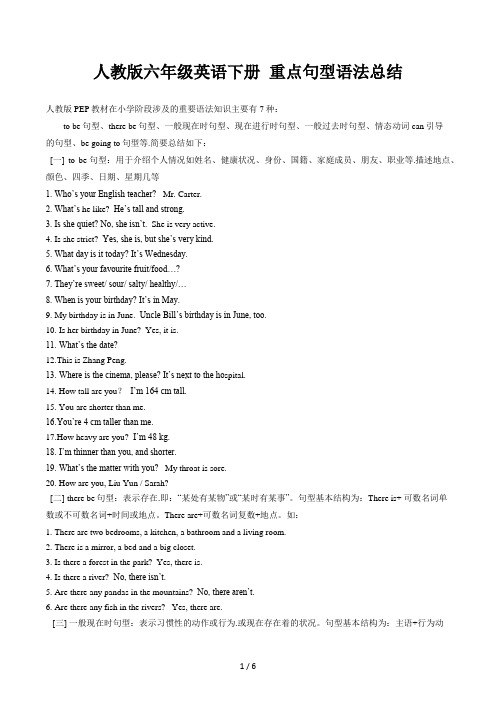
人教版六年级英语下册重点句型语法总结人教版PEP教材在小学阶段涉及的重要语法知识主要有7种:to be句型、there be句型、一般现在时句型、现在进行时句型、一般过去时句型、情态动词can引导的句型、be going to句型等.简要总结如下:[一] to be句型:用于介绍个人情况如姓名、健康状况、身份、国籍、家庭成员、朋友、职业等.描述地点、颜色、四季、日期、星期几等1. Who’s your English teacher? Mr. Carter.2. What’s he like? He’s tall and strong.3. Is she quiet? No, she isn’t. She is very active.4. Is she strict? Yes, she is, but she’s very kind.5. What day is it today? It’s Wednesday.6. What’s your favourite fruit/food…?7. They’re sweet/ sour/ salty/ healthy/…8. When is your birthday? It’s in May.9. My birthday is in June. Uncle Bill’s birthday is in June, too.10. Is her birthday in June? Yes, it is.11. What’s the date?12.This is Zhang Peng.13. Where is the cinema, please? It’s next to the ho spital.14. How tall are you?I’m 164 cm tall.15. You are shorter than me.16.You’re 4 cm taller than me.17.How heavy are you? I’m 48 kg.18. I’m thinner than you, and shorter.19. What’s the matter with you? My throat is sore.20. How are you, Liu Yun / Sarah?[二] there be句型:表示存在.即:“某处有某物”或“某时有某事”。
英语语法重点

英语语法重点1、what did you \ he \ she \they+过去时间?回答用i\he \ she \ they+动词过去式。
2、Let’s+动词原形3、Like+单词ing形式4、过去时一般疑问句结构Did+人称+动词原形(单词或短语)+过去时间?肯定回答:yes,人称+did. 否定回答:no,人称+didn’t.5、过去时句结构:人称+didn’t+动词原形(单词或短语)+过去时间例如:He didn’t clean the window yesterday.5、一般过去时陈述句的基本构成:人称(主语)+过去式动词短语+过去时间(yesterday, the day before yesterday,last month, lsat night,last week,)6、一般过去时一般疑问句的基本构成:Did +人称(主语)+动词原形+过去时间?7、(some\something用于肯定句;any\anything用于否定句和疑问句。
)8、look for寻找,强调找的过程find\found找到,强调找的结果9、What happened to+宾格(him\ her\ them)?10、be going to +动词原形。
Be going to将来时构,表示将要做某事。
11、回答含有Why的问句,一般用Because来作答。
12、Can you +动词原形,Can +动词原形。
13、动词后面跟宾格,单数用it,复数用them14、can , will , must , have to+动词原形15、祈使句的句型结构:○1Do型(动词原形+宾格+其他成分)○2Be 型(be+形容词或名词+其他成分)○3Let 型(let+宾格+动词原形+其他成分)。
高中英语13个语法考点归纳
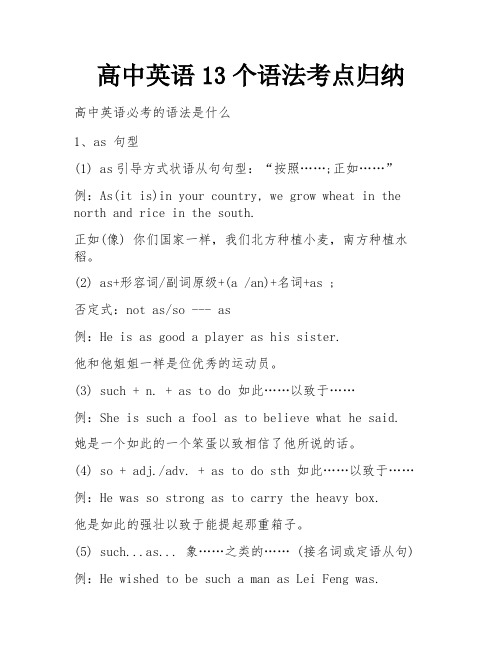
高中英语13个语法考点归纳高中英语必考的语法是什么1、as 句型(1) as引导方式状语从句句型:“按照……;正如……”例:As(it is)in your country, we grow wheat in the north and rice in the south.正如(像) 你们国家一样,我们北方种植小麦,南方种植水稻。
(2) as+形容词/副词原级+(a /an)+名词+as ;否定式:not as/so --- as例:He is as good a player as his sister.他和他姐姐一样是位优秀的运动员。
(3) such + n. + as to do 如此……以致于……例:She is such a fool as to believe what he said.她是一个如此的一个笨蛋以致相信了他所说的话。
(4) so + adj./adv. + as to do sth 如此……以致于……例:He was so strong as to carry the heavy box.他是如此的强壮以致于能提起那重箱子。
(5) such...as... 象……之类的…… (接名词或定语从句)例:He wished to be such a man as Lei Feng was.他希望成为一个像雷锋这样的人。
(6) the same +名词+as 和……一样的…… (接名词或定语从句)例:He is not the same man as he used to be.他不是从前的那样子了。
(7) as 引导非限制性定语从句例:As is known to us, knowledge is power.众所周知,知识就是力量。
(8)引导时间状语从句,与while意义相近例:We get wiser as we get older.随着我们长大,我们也变得越来越聪明。
(9) 引导原因状语从句,与 because的用法相近例:As it was getting very late, we soon turned back.因为越来越迟了,所以我们不久就回来了。
英语语法必备重点句型

英语语法必备重点句型1. want to do sth.想做某事例:I want to go to school.我想去上学2. want sb. to do sth.想让某人做例: I want my son to go to school.我想让我的儿子去上学3. be different from 与…不同例: The weather in Beijing is different fro m that of Nanjing.北京的天气和南京的不同4. be the same as 与…相同例: His trousers are the same as mine.他的裤子和我的一样。
5. be friendly to sb.对某人友好例: Mr. Wang is very friendly to us.王先生对我们非常友好。
6. welcome to sp.欢迎来到某地例: Welcome to China. 欢迎来到中国。
7. What's the matter with sb./sth.某人/某物出什么毛病了例: What's the matter with your watch?你的手表怎么了?8. what to do 做什么例: We don't know what to do next.我们不知道接下来要做什么9. let sb. do sth.让某人做某事例:Let him enter the room.让他进入房间。
10. let sb. not do sth.让某人不做例: Let him not stand in the rain.让他不要站在雨中。
11. why don't you do sth.你怎么不做某事呢例: Why don't you play football with us?你怎么不和我们踢足球呢?12. why not do sth.怎么不做某事呢例: Why not play football with us?为什么不和我们踢足球呢?13. make sb. sth.为某人制造某物例: My father made me a kite.我爸爸给我做了一个风筝。
高一重点英语句型

以下是高一重点英语句型:
1. 主语+谓语(不及物动词)+状语
该句型中,谓语动词为不及物动词,不能直接接宾语,但是可以接状语。
例如:
The students are listening to the teacher carefully.
学生们正在认真听老师讲课。
2. 主语+谓语(及物动词)+宾语
该句型中,谓语动词为及物动词,可以直接接宾语。
例如:
I like English very much.
我非常喜欢英语。
3. 主语+谓语+间接宾语+直接宾语
该句型中,谓语动词后接两个宾语,一个是直接宾语,一个是间接宾语。
例如:
My friend gave me a book.
我的朋友给了我一本书。
4. 主语+谓语+宾语+宾补
该句型中,谓语动词后接一个宾语和一个宾补,用来补充说明宾语的性质或状态。
例如:
I found him playing in the garden.
我发现他在花园里玩耍。
5. 主语+系动词+表语
该句型中,谓语动词为系动词,后面接表语,用来描述主语的性质或状态。
例如:
He looks very happy.
他看起来很开心。
以上是高一重点英语句型中的五个常见句型,掌握这些句型可以帮助你更好地理解和运用英语语法,提高英语表达能力。
初中英语语法最有用的150条英语短语句型

初中英语语法最有用的150条英语短语句型初中英语语法最有用的150条英语短语句型〔一〕1 (see 、hear 、notice 、find 、feel 、listen to 、look at (感官动词)+do eg:I like watching monkeys jump2 〔比较级and 比较级〕表示越来越怎么样3 a piece of cake =easy 小菜一碟〔容易〕4 agree with sb 赞成某人5 all kinds of 各种各样a kind of 一样6 all over the world = the whole world 整个世界7 along with同……一道,伴随……eg : I will go along with you我将和你一起去the students planted trees along with their teachers 学生同老师们一起种树8 As soon as 一怎么样就怎么样9 as you can see 你是知道的10 ask for ……求助向…要…〔直接接想要的东西〕eg : ask you for my book11 ask sb for sth 向某人什么12 ask sb to do sth 询问某人某事ask sb not to do 叫某人不要做某事13 at the age of 在……岁时eg:I am sixteen I am at the age of sixteen14 at the beginning of …………的起初;……的开始15 at the end of +地点/+时间最后;尽头;末尾eg : At the end of the day17 be /feel confident of sth /that clause +从句感觉/对什么有信心,自信eg : I am / feel confident of my spoken English I feel that I can pass the test18 be + doing 表:1 现在进行时2 将来时19 be able to (+ v 原) = can (+ v 原〕能够……eg : She is able to sing She can sing20 be able to do sth 能够干什么eg :she is able to sing21 be afraid to do (of sth 恐惧,害怕……eg : I'm afraed to go out at night I'm afraid of dog22 be allowed to do 被允许做什么eg: I'm allowed to watch TV 我被允许看电视I should be allowed to watch TV 我应该被允许看电视23 be angry with sb 生某人的气eg : Don't be angry with me24 be angry with(at) sb for doing sth 为什么而生某人的气25 be as…原级…as 和什么一样eg : She is as tall as me 她和我一样高初中英语语法最有用的150条英语短语句型〔二〕26 be ashamed to27 be away from 远离28 be away from 从……离开29 be bad for 对什么有害eg : Reading books in the sun is bad for your eyes 在太阳下看书对你的眼睛不好30 be born 出生于31 be busy doing sth 忙于做什么事be busy with sth 忙于……32 be careful 留神;小心33 be different from……和什么不一样34 be famous for 以……著名35 be friendly to sb 对某人友好37 be full of 装满……的be filled with 充满eg: the glass is full of water the glass is filled with water38 be glad+to+do/从句39 be going to + v(原〕将来时40 be good at(+doing) = do well in 在某方面善长, 善于……41 be good for 对什么有好处eg : Reading aloud is good for your English42 be happy to do 很快乐做某事43 be helpful to sb 对某人有好处eg : Reading aloud is helpful to you 大声朗读对你有好处Exercising is helpful to your bady 锻炼对你的身体有好处44 be in good health 身体健康45 be in trouble 处于困难中eg : She is in trouble They are in tronble46 be interested in 对某方面感兴趣48 be like 像……eg : I'm like my mother49 be mad at 生某人的气50 be made from 由……制成(制成以后看不见原材料)初中英语语法最有用的150条英语短语句型〔三〕51 be made of 由……制成(制成以后还看得见原材料)52 be not sure 表不确定53 be on a visit to 参观54 be popular with sb 受某人欢迎55 be quiet 安静56 be short for 表**的缩写eg: 陶is short for 陶俊杰57 be sick in bed 生病在床58 be sorry to do sth be sorry for sb eg : I am sorry for you59 be sorry to hear that60 be sorry to trouble sb eg : I am sorry to trouble you61 be strict in doing sth 严于做某事eg : He's strict in obeying noles62 be strict with sb 对某人要求严格eg: Some students are not strict with them selves 这些学生对自己不严格63 be strict with sb in sth 某方面对某人严格64 be supposed to do 被要求干什么65 be sure 表确定66 be sure of doing sth 对做某事有信心eg: He is sure of winning I am sure of learning English well67 be sure of sth 对做某事有信心eg: I'm sure of my head (my teacher 我相信我的大脑〔老师〕68 be sure that sth 对做某事有信心eg: I'm suer that he can pass the test 我相信他能通过考试69 be sure to do sth一定会做某事eg: We are sure to pass the test 我们一定会通过这次考试We are sure to learn English well 我们一定能学好英语70 be terrified of + 名/动doing 害怕……71 be terrified to do sth 害怕做某事72 be the same as …和什么一样73 be used to doing sth 习惯做某事eg: My father is used to getting up early 我爸爸习惯早He is used to sleeping in class 他习惯上课睡觉74 be worth doing 值得做什么75 be(feel) afraid to do sth 害怕做某事be afraid of sth 害怕某物be afraid that 丛句76 because+句子because of +短语eg : He was late because he had a headache He was late because of his headache77 begin to do = start to do 开始做某事start…with…=begin…with…以什么开始什么eg : Let's begin the game with the song I begin to go home78 between…and…两者之间79 borrow sth from sb 向……借……lend sth to sb ( lend sb sth 借给……什么东西eg : I borrowed a pen from him he lent a pen to me ( he lent me a pen80 both = the same(as) = not different(from) 表相同81 bother 打搅bother sb to do stheg : I'm sorry to bother you ,but can you tell me to way to the station我十分抱歉打搅你,但是你能告诉我怎么去车站the problem has been bothering me for weeks 这个问题困扰了我几个周了He's bothering me to lend him money82 by the end of 到……为止83 call sb sth eg : We call him old wang84 care 关心eg : Don't you care about this country's future 你为什么不关心国家的未来85 catch up with sb 赶上某人86 chat with sb 和某人闲谈take sb to + 地点带某人去某地91 consider + doing 考虑做什么eg : Why not consider going to lu zhou 为什么不考虑去泸州92 dance to 随着……跳舞eg : She likes dancing to the music 她喜欢随着音乐跳舞93 decide to do sth 决定做某事94 do a survey of 做某方面的调查95 do better in 在……方面做得更好96 do wrong 做错97 Don't forget to do sth 不要忘了做某事98 Don't mind +doing /从句/名词不要介意……99 each +名〔单〕每一个…eg : Each student has many books 每一个学生都有一些书100 end up +doing初中英语语法最有用的150条英语短语句型〔四〕101 enjoy +doing喜欢102 escape from 从……逃跑eg: The prisoners have escaped from the prison犯人从监狱里逃跑出来103 expect to do sth 期待做某事104 fall down 摔下来fall off 从哪摔下来105 fall in love with sb /sth 爱上什么106 far from 离某地远eg : The school is far from my home107 find +it +adj +to do 发现做某事怎么样108 find sb/sth +adj 发现什么怎么样eg : I find the book interesting109 finish 完成+doing〔名词〕110 fit to sb = be fit for sb 适合某人111 forget to do 没有做而忘了forget doing 做了而又忘了eg: Don't forget to go home I forget closing door112 from…to…从某某到某某eg: From me for her113 get /have sth down 做完,被〔别人〕做…eg: I have my hair cut 我理了发(头发被剪了〕Tom got his bad tooth pulled out 汤母把他的坏牙拔掉了〔被牙医拔掉了〕115 get along well with sb = get on well with sb 与某人相处得好116 get along with sb = get on with sb 与某人相处117 get ready for = be ready for为什么而准备eg : I get ready for math I am ready for math118 get sb in to trouble 给某人麻119 get sb to do sth120 get…from…从某处得到某物121 give a talk 做报告eg: He is give a tall122 give sth to sb give sb sth 给某人某物123 go fish 钓鱼go swimming 游泳124 go on to do 去做下一件事go on doing 继续做这件事125 go out away from go out of初中英语语法最有用的150条英语短语句型〔五〕126 go to school 上学〔用于专业的〕go to the school 去学校〔不一定是上学〕127 good way to 好方法128 hate to do 讨厌没做过的事hate doing 讨厌做过的事129 have a party for sb 举办谁的晚会130 have a talk 听报告谈一谈131 have been doing 现在完成进行时eg : You have been talking You have been sleeping since132 have been to …( 地方〕……去过某过地方have gone to …〔地方〕去了某地还没回来133 have fun +doing 玩得快乐134 have sth to do 有什么事要做eg: I have a lot of homework to do 我有很多家庭作业要做I have nothing to do 我没什么事情做136 have trouble (problem) (in) doing sth 做什么事情有麻烦138 have…(时间)…off 放……假eg: I have month off 我请一个月得假140 help a lot 很大用处141 help sb with sth \one's sth 帮助某人某事〔某方面〕help sb (to) do sth 帮助某人做某事142 hope to do sth 希望做某事143 How about(+doing) = What about(+doing)144 how do you like = what do you think of 你对什么的看法145 if : 是否=wethereg: I don't know if (wether) I should go to the party 我不知道我是否应该去参加晚会146 if :如果,假设〔全部接一般时态〕+条件语态从句eg: I'll go to LuZhou if it does't rain 假设明天不下雨,我就去泸州If they change the plan they will let me know 假设他们要改变方案,他们会让我知道的I'll go to England ,if I have enough money next year 如果我明年由足够的钱,我就要去英国147 in one's opinion = sb think 某人认为148 in some ways 在某些方面149 in the end = finally(adv) 最后150 in the north of…什么在什么的北方〔north 北sowth 南west 西east 东〕。
高中英语基本句式-语法重点

7定语 对名词或代词起修饰、限定作用的词、短语或
句子
It is an interesting story. (有趣的故事)
在英语中,许多情况下,定语是放在所修饰词 后面的,这点与汉语习惯不同,也是许多同学
不能读懂长句的主要原因。
定语后置常见的有以下几种情况:
A.副词用作定语一般要后置。 People there are very friendly. (那儿的人们) He didn't like the man downstairs. (楼下的那 个人)
get, buy, make
He got an English-Chinese Dictionary for me.
基本句型四:SVOC (主+谓+宾+宾补)
有些动词虽然是及物动词,但是只跟一个宾语 还不能表达完整的意思,宾语后必须加上一个 补充成分才能使意思完整。所加的成分就是宾 语补足语。
宾语和宾语补足语构成逻辑上的主谓关系,它 们一起构成复合宾语。
4.Unfortunately, he lost all of his money. (修饰整个句子用副词,作状语)
A.几个并列状语的先后顺序:方式→地点→时间。 He was walking slowly outside the park at that moment. B.英语中时间状语、地点状语的排列一般是从小到大。 I was born at 6 a.m., March 16, 2000. He lives at 1120 Green Street, London.
✓ He passed me a cup of tea. She bought me some books.
✓ Bring it to me, please.
新概念英语第二册第20课重点语法句型
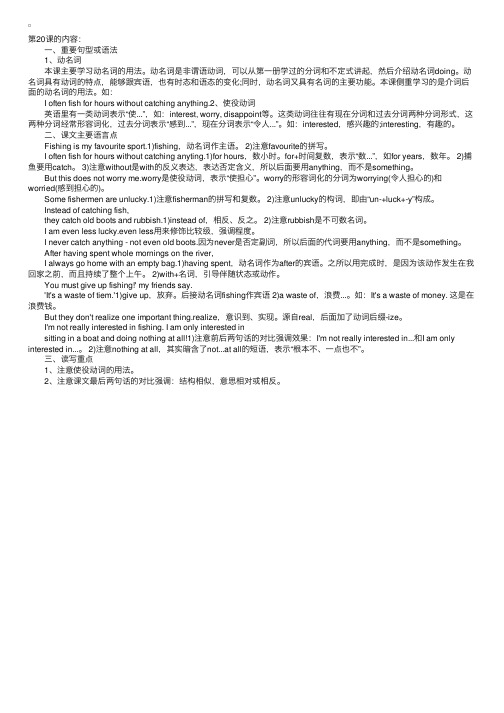
第20课的内容: ⼀、重要句型或语法 1、动名词 本课主要学习动名词的⽤法。
动名词是⾮谓语动词,可以从第⼀册学过的分词和不定式讲起,然后介绍动名词doing。
动名词具有动词的特点,能够跟宾语,也有时态和语态的变化;同时,动名词⼜具有名词的主要功能。
本课侧重学习的是介词后⾯的动名词的⽤法。
如: I often fish for hours without catching anything.2、使役动词 英语⾥有⼀类动词表⽰“使...”,如:interest, worry, disappoint等。
这类动词往往有现在分词和过去分词两种分词形式,这两种分词经常形容词化,过去分词表⽰“感到...”,现在分词表⽰“令⼈...”。
如:interested,感兴趣的;interesting,有趣的。
⼆、课⽂主要语⾔点 Fishing is my favourite sport.1)fishing,动名词作主语。
2)注意favourite的拼写。
I often fish for hours without catching anyting.1)for hours,数⼩时。
for+时间复数,表⽰“数...”,如for years,数年。
2)捕鱼要⽤catch。
3)注意without是with的反义表达,表达否定含义,所以后⾯要⽤anything,⽽不是something。
But this does not worry me.worry是使役动词,表⽰“使担⼼”。
worry的形容词化的分词为worrying(令⼈担⼼的)和worried(感到担⼼的)。
Some fishermen are unlucky.1)注意fisherman的拼写和复数。
2)注意unlucky的构词,即由“un-+luck+-y”构成。
Instead of catching fish, they catch old boots and rubbish.1)instead of,相反、反之。
英语句式语法
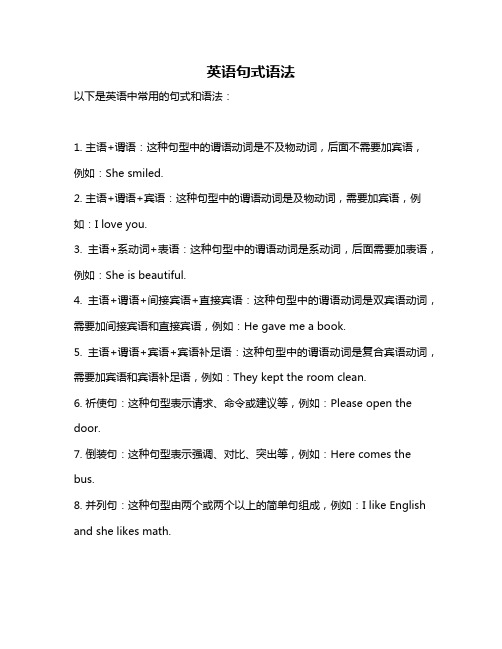
英语句式语法
以下是英语中常用的句式和语法:
1. 主语+谓语:这种句型中的谓语动词是不及物动词,后面不需要加宾语,例如:She smiled.
2. 主语+谓语+宾语:这种句型中的谓语动词是及物动词,需要加宾语,例如:I love you.
3. 主语+系动词+表语:这种句型中的谓语动词是系动词,后面需要加表语,例如:She is beautiful.
4. 主语+谓语+间接宾语+直接宾语:这种句型中的谓语动词是双宾语动词,需要加间接宾语和直接宾语,例如:He gave me a book.
5. 主语+谓语+宾语+宾语补足语:这种句型中的谓语动词是复合宾语动词,需要加宾语和宾语补足语,例如:They kept the room clean.
6. 祈使句:这种句型表示请求、命令或建议等,例如:Please open the door.
7. 倒装句:这种句型表示强调、对比、突出等,例如:Here comes the bus.
8. 并列句:这种句型由两个或两个以上的简单句组成,例如:I like English and she likes math.
9. 省略句:这种句型省略了某些不必要的部分,例如:Let’s go (to the park).
10. 强调句:这种句型强调某个成分,例如:It was she who helped me. 以上是英语中常用的句式和语法,希望能对您有所帮助。
3到6年级英语重点句型及语法

重点句型:1.、What a nice present!多好的礼物啊!【解析】此句为感叹句,感叹句是用来表示说话人强烈的情绪的句子,多用how和what引起,其基本句型为:“What+名词+主语+谓语”和“How+形容词+主语+谓语”。
两者可互换。
2.、Don't go outside!不要到外面去!【解析】此句是一个祈使句。
祈使句可用来表示请求,命令,建议,邀请,禁止等。
3.、When I was young,I couldn't play with candles. I couldn't cook,either.当我小的时候,我不能玩蜡烛,也不能做饭。
【解析】play with意为“玩耍”。
play with fire玩火;play with balls玩球。
【辨析】either意为“也”,放在否定句句末。
too,also都表示“也”的意思,too放肯定句句末或疑问句中。
also常用于肯定句中,放在be动词后面,行为动词前面。
重点语法:动词加-s或-es方法歌诀:动词三单现在式,一般词尾加-s。
s, x, ch, sh在词尾,直接加上-es。
词尾若是字母o,加上-es不用愁。
“辅音字母+y“来结尾,变y为i是正规。
-es后边紧跟随,study→studies看明白。
“be going to”的用法口诀:be going to, 表打算,准备、计划将干。
表可能,有必然,通过现象来推断。
使用它,要注意,疑问形式be提前。
否定句,更简单,not放在be后边。
to之后,动原形,be的形式看人称。
下列词,要注意,come go和离去进行时,表将来,牢牢记住莫忘记。
英语复习:复习所有在课本里的必备词汇,在复习的时候,不仅之复习词汇,你还要对这些词汇所组成的词组也要做一个系统的联想性的复习。
复习课本的里的英语阅读资料,因为在很多期末考试中,原有课文的阅读资料都会有一定的占比。
并且这样的占比还不是很小。
英语重点句型及如何使用

九年级Unit 1—8Unit 1Section 1A1.by介词,“通过…(方式,手段)”by making flashcards 通过做单词抽认卡by doing sth 通过…..方式(途径)。
例:I learn English by listening to tapes.②在…..旁边。
例:by the window/the door③乘坐交通工具例:by bus/car④在……之前,到……为止。
例:by October在10月前⑤被例:English is spoken by many people.2.read the textbook读/看教科书3.make vocabulary lists 列生词表4.listen to tapes听磁带5.ask sb for help向某人求助6.study for a test为备考学习7.watch videos观看录像8.practice sth练习某事;practice doing sth练习做某事Do you ever practice conversations with friends (与朋友对话) I have to practice speaking English everyday.9.read aloud朗读10.that way=in that way 通过那种方式11.improve my speaking skills提高我的会话技巧12. too…to…太….而不能…It’s too hard for me to understand the article. = It’s so hard that I can’t understand the article.13. for example=for instance 例如14. ask about询问有关…;ask sb about sth向某人询问/打听有关…. We asked them about the best ways to learn more English. I want to ask about the use of the new machines.15. watch/see/hear sb do sth观看/看见/听见某人做过某事;watch/see/hear sb doing sth观看/看见/听见某人正在做某事 He can watch actors say the words. Can you hear him singing in the room16. 辨析:sometime ;sometimes ;some times ;some time ①sometime在将来/过去的某一时间 I’ll speak to him about it sometime. 我会找个时间和他谈谈这事. I met her sometime last year.去年的某个时候我见过她. ②sometimes = at times有时,偶尔It is sometimes hot and sometimes cold here. He sometimes writes to me. ③some time A.一些时间:It will take you some timeto walk there. B.在未来的某时=sometime: Phone me some time next week下个星期什么时候给我打电话吧. ④some times一些次,几次 I've told him the thing sometimes.17. join短语:①join sb加入到某人的活动中去②join in+活动项目"参加…活动" I'd like to join in the game. ③join+组织机构"加入到某个组织机构,成为其中的一个成员"join the Party; join the League, The best way to improve your English is to join an English club18. have fun 玩得高兴19. not at all 一点也不20. get excited 高兴、激动21. end up (vi.) 结束; 告终; 结果 ; 最后end up doing sth.We end up taking a taxi there .我们结果乘出租车去了那里. We sometimes end up speaking in Chinese.(以说汉语结束对话)22. do a survey 做调查;do a survey about针对…做调查 I'm doing a survey about learning English. 我在进行学习英语的调查。
高中英语重点语法归纳

高中英语重点语法归纳一、时态和语态1. 一般现在时:表示经常性、习惯性的动作或真理。
2. 现在进行时:表示现在正在进行的动作。
3. 一般过去时:表示过去发生的动作或状态。
4. 过去进行时:表示过去某一时刻正在进行的动作。
5. 一般将来时:表示将来要发生的动作或打算。
6. 现在完成时:表示过去发生的动作对现在造成的影响或结果。
7. 过去完成时:表示过去某一时间点之前已经完成的动作。
8. 将来完成时:表示将来某一时间点之前将要完成的动作。
9. 被动语态:表示动作的承受者是主语。
二、句型和从句1. 陈述句:陈述一个事实或描述一个情况。
2. 疑问句:用于询问信息或确认事实。
3. 祈使句:用于表达命令、请求、建议等。
4. 感叹句:用于表达惊讶、赞美、愤怒等情感。
5. 条件句:表示假设条件,常使用if引导。
6. 时间状语从句:表示时间关系,常使用when、while、before、after等引导。
7. 原因状语从句:表示原因关系,常使用because、since、as等引导。
8. 结果状语从句:表示结果关系,常使用so that、so...that、such...that等引导。
9. 目的状语从句:表示目的关系,常使用so that、in order that等引导。
10. 比较状语从句:表示比较关系,常使用than、as...as等引导。
三、名词和代词1. 可数名词:可以用数目词修饰,有单数和复数形式。
2. 不可数名词:不能用数目词修饰,只有单数形式。
3. 可数名词的复数形式:一般在词尾加-s,但也有一些特殊变化。
4. 不可数名词的量词:用some、any、a lot of、much、little等修饰。
5. 人称代词:代替人或事物的代词,有主格和宾格之分。
6. 物主代词:表示所有关系的代词,有形容词性和名词性之分。
7. 反身代词:表示动作反射到自身的代词,有单数和复数形式。
8. 指示代词:用来指示人或事物的代词,有近指和远指之分。
